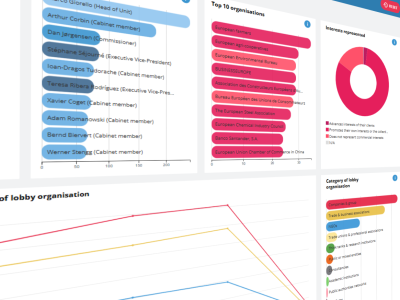In October 2020, Transparency International EU (TI EU) published new research on the tax affairs of 39 of Europe’s largest banks from 2015 to 2019. The findings – included in our updated Corporate Tax Tracker platform and our new report Murky Havens and Phantom Profits – suggest widespread use of tax havens and profit shifting.
Civil society organisations, such as TI EU, are able to carry out this kind of data-driven research, as they have access to banks’ financial information thanks to a ground-breaking law adopted by the EU in 2013 – the Capital Requirement Directive (CRD) IV. This legislation requires banks to publish key data on a country-by-country basis for each country in which they have activities. This information provides citizens with a glimpse into how large EU-based banks operate, where they operate and how their money moves around. As shown by our analysis, public country-by-country reporting (CBCR) legislation has been a game-changer for the banking sector, ensuring public availability of key financial data. This has significantly improved transparency and accountability in a notoriously opaque sector, despite the clear existing limitations of the data provided.
However, the banking sector is one of the rare beacons of light in the uncharted ocean of financial transparency. Currently multinational companies’ tax affairs remain secretive and far-removed from public scrutiny. The absence of a comprehensive corporate financial transparency regime has led to a situation in which questionable corporate tax arrangements are often only brought to light by leaks.
TI EU has long been calling for EU public CBCR rules to be extended to large multinationals in all other sectors of the economy. A legislative proposal by the European Commission has been on the table since 2016. However, the political will to ensure more stringent tax transparency requirements for multinationals is still lacking. This legislative process has been stuck for the last couple of years in the EU Council, with several Member States still strongly opposed to the measure.
Recently, there was an important opportunity to progress the public CBCR process at EU level. Currently, it appears that there is a qualified majority of Member States in the EU Council who support adopting a final position on this file, since Austria has shifted its position on the file moving towards the support of a Council’s general approach back in spring.
Alongside allied civil society organisations in Germany (translation in English provided by Corporate Europe Observatory) as well as Members of the European Parliament, we have been calling on the German Presidency of the Council of the EU to table the file for a discussion at both technical and political levels in the Council’s Working Party on Company Law and in the Competitiveness (COMPET) Council, followed by a vote to end the current deadlock.
However, the German Presidency remained reluctant to facilitate a discussion in Council, citing the divided views in their national government as the reason, despite the Presidency’s obligation to facilitate dialogue in a neutral manner. This goes against the principle that EU Presidencies must act in the interest of the EU as a whole and shouldn’t block a file based on their national political stance.
During the month of November there would have been three opportunities for a political discussion in the COMPET Council (19, 20, 27 November). Germany, however, chose to breach the Council Presidency’s principle of neutrality and, consequently, the EU missed an important opportunity to move forward in its work against tax secrecy.
All eyes are now on the Portuguese EU Presidency, due to begin in January 2021, to make progress and finally adopt the Council’s position to ensure long-awaited trilogue negotiations with the European Parliament and Commission can begin.




